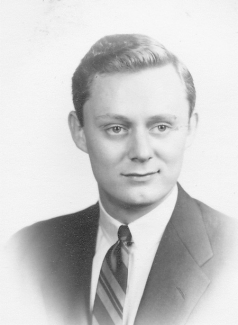
By Ann Blackford
Many words come to mind when describing Col. Douglas A. Harper: career serviceman, craftsman, history buff, world traveler, avid reader, genealogist and veteran.
But his legacy at the University of Kentucky will be one of generosity. The 1954 alumnus included UK Libraries in his estate plan, hoping to protect and grow the places where he now calls home.
"As a genealogist, I learned early on that libraries and their collections were a wonderful asset,” Harper said. “Because I was familiar with the University of Kentucky Libraries, I put a nice amount into my trust to be added to UK Libraries.”
The Harrison County, Kentucky native came to UK in 1950. Passionate about service, he joined the Air Force ROTC as he earned his bachelor’s degree in business. Upon graduation, he began a lifelong military career, serving active duty with the Air Force and graduating to a pilot at Webb Air Force Base, Texas. He then trained to become a ground control intercept director, where he guided U.S. interceptor aircraft that flew against hostile aircraft.
Harper's career led him to many locales, including Canada, Japan, Iceland, Washington, Wisconsin, California, Colorado, Florida, Mississippi and the Pentagon in Washington, D.C. In Iceland, he held his first command assignment as commander of a radar squadron, and he commanded the Weapons Controller School at Tyndall Air Force Base in Panama City, Florida.
After retiring in 1978 with the rank of colonel after more than 23 years of service, Harper settled in Biloxi, Mississippi, the site of his last assignment. He filled his days with hobbies, including genealogy, baking rum cakes and reading – he has read more than 569 books to date.
Undeniably a man of many talents, Harper is a self-taught needle pointer, a skill he developed while stationed in Iceland. He has completed countless needlepoint pieces, some of which are his own designs, and many of which he gives as gifts to his fellow genealogists.
But after Hurricane Katrina's destruction in 2005, Harper decided to move back to his home state of Kentucky, and he now resides in Lexington.
Retirement didn't signal the end of Harper's love of travel. Trading in his position of guiding military aircraft for the passenger seat of a commercial plane, his post-retirement travels have taken him all over the world and all seven continents. In the past few years alone, he has taken more than 76 cruises and land tours which have included destinations such as Costa Rica, Mexico, Peru, Machu Picchu, Egypt, China, the Galapagos Islands, Australia, New Zealand, Norway, Finland, Iceland, Greece, Turkey, Italy and Antarctica.
He celebrated his November 2018 birthday with a cruise to the Panama Canal, and he is already planning his next adventure in the summer of 2019: a paddle wheel cruise down the Mississippi River.
Throughout his life, Harper developed a strong interest in his family genealogy, and many of his travels led him to research facilities around the country, where he has spent countless hours collecting data about his ancestry.
Libraries have always played an important role in his research endeavors. After returning to Lexington, Harper once again found himself on UK's campus at the Special Collections Research Center in the King Library building, where he is often spotted in the Breckenridge Research Room.
His gift will support UK's Special Collections Research Center, the university's repository for historical documents and archives related to the history of the Commonwealth.
"Gifts of archives and manuscripts from all over the state and the country allow us to compile and sustain the Commonwealth of Kentucky’s memory," said Daniel King, director of philanthropy, UK Libraries. "While donations of materials are incredibly important towards building our collection of the social, cultural, economic and political landscape of our state, it takes time and resources to process, preserve and make accessible donations that can range from personal journals to historic photographs to business ledgers and more. Col. Harper’s gift will allow us to make resources available for students, faculty, staff and community members who want to learn more about our collective past."
